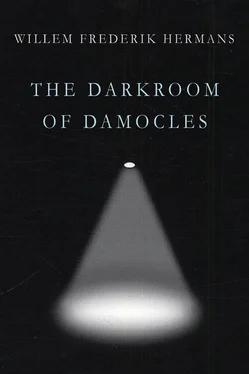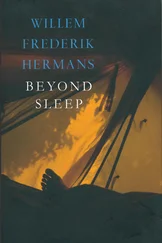‘Mr Nauta!’ shouted Inspector Selderhorst. ‘Was he working for the Germans?’
‘Working for the Germans? What does it matter? All I know is that he never had ideals. Always taking the path of least resistance. I offered to send him to university, but all he wanted was to hang around in a tobacco shop doing nothing, when everyone knows that nicotine is a dangerous poison. All my life I have fought against alcohol, tobacco and the excessive consumption of meat. Total disarmament was my ideal, but as a boy he was too lazy even to address the envelopes for my temperance meetings.’
‘Did you suspect him of anything?’
‘I brought him up as my own son. Why would I harbour suspicions against him? The mere thought of him acting dishonourably was intolerable to me. What I do know, though, is that when his mother was arrested he made no effort whatsoever, none at all, to secure her release. I said to him: why don’t you go to the Krauts, why don’t you say: here I am, take me instead of my mother? But he wouldn’t hear of it.’
Osewoudt got up from his chair, as if he were not close enough to Uncle Bart already. He put his hands on the armrests of the wheelchair and, leaning so far forward he seemed minded to kiss the old man on the forehead, he cried: ‘Uncle Bart, I’m sorry about everything, but I am innocent of the crimes they suspect me of. Do you remember me telling you about Dorbeck?’
Uncle Bart’s head fell again, but he made a final effort to lift his eyes to Osewoudt.
‘I am tired. I would rather go now!’
His eyes filled with tears and he began to sob audibly, while his nurse took a folded napkin from her bag, shook it out, and wiped the dribble from his lips and his coat.
‘Uncle Bart, this is extremely important to me. Do you remember the name Dorbeck?’
A kind of whimpering rose from Uncle Bart’s throat, as from a dying dog after being hit by a car. He was too choked up to speak any more. His head jolted sideways and reared up again. Then it lolled to the side once more.
Osewoudt stood up straight. He held his hand out to Selderhorst.
‘He’s shaking his head no,’ he said imploringly. ‘Shaking his head, saying no, he can’t remember. But what does that prove? He’s an old man. The Germans have maltreated him. He can’t help it that his memory’s gone. What does this prove against me?’
Each morning the prisoners had to do half an hour of gymnastics in the factory yard. Running, leapfrogs, belly-crawls, rolls, vaults. It was Osewoudt’s first time. He ran harder than the others, leaped further, crawled faster, rolled like a marble and vaulted higher. As a punishment the others had to keep it up for an extra quarter of an hour. Osewoudt was allowed to sit and watch.
Spuybroek wandered on to the yard, caught sight of Osewoudt and squatted down beside him.
‘I’ve got a secret,’ he said. ‘Important news! Listen to this! That picture of you we published has been getting some response. Your uncle isn’t the only person to have come forward. We’ve had word from a British army commander in Germany. They’ve excavated a mass grave somewhere near Oldenburg. It seems they’ve found a body that fits the description.’
‘Hardly surprising, is it? And I suppose you want me to provide proof that it’s Dorbeck? Me furnish proof? I’m the one nobody believes, remember? How can I prove anything about a corpse that’s been buried for at least six months?’
‘Shut up for a minute, I haven’t finished. Do you remember mentioning the name Jagtman to me? Jagtman … the name passed on to you by Dorbeck, along with an address. You were to send photos there. Legmeerplein in Amsterdam, it was. But when you went to follow it up you found that the building had been destroyed by a plane crash the night before, and the whole Jagtman family had been killed. Wasn’t that what you told me?’
‘Yes, more or less.’
‘Well, then. Do you know who’s come forward? The family dentist. He knows exactly what the teeth of the various Jagtmans looked like. Now if the teeth of that body in Oldenburg can be matched with a member of the Jagtman family, we’ll be getting somewhere. It would go some way to explaining why no one’s heard of Dorbeck. Then it would be reasonable to assume that Dorbeck was an alias and that his real name was Jagtman. Let me tell you something: ever since you actually turned up the remains of that uniform, back in Voorschoten, my opinion of you has changed.’
‘Oh really?’ Osewoudt said. ‘So tell me, if that body in Oldenburg is in fact the body of a Jagtman, how am I to explain what it’s doing in Germany when the entire Jagtman family was wiped out in Amsterdam by the plane that came down on their house? Every time there’s a chance, however slim, of proving that Dorbeck really existed, fresh complications arise. What use to me is a dead Dorbeck in Germany? The living Dorbeck is what I need, to come here and prove my innocence! And I’m certain he’s still alive! Colonel Smears, who interrogated me in England, never denied his existence either.’
Spuybroek began to whistle, straightened up, and walked away. Osewoudt stared at the prisoners running round in circles. The sun was shining, the wind was blowing from the flavouring extracts factory, and it smelled of vanilla. If the dentist was able to identify the body in Germany, what would the consequences be?
After a shout from the sergeant in charge, one of the prisoners left the group and came to sit beside Osewoudt.
He was young, seventeen at most. He had a high forehead and the green, shallow-socketed wolf’s eyes of the wildest Germanic tribes.
‘You’re Osewoudt, aren’t you? Interesting to talk to you. Everyone’s heard about your case. If you ask me, the hunt for Dorbeck’s like walking through quicksand: every step you take you sink deeper. What’s your view?’
‘That’s none of your business.’
‘If you ask me, Osewoudt, you’re a real bastard. I’m not saying that to have a go at you, it’s the truth. You know the trouble with most Dutchmen? They never learned to think. Take me. I joined the SS a year ago. I’m a theorist, an amoral theorist. A theorist, because I can’t stand the sight of blood, and besides, by the time I joined, Germany was already losing the war and there were SS men running for cover with the Resistance. It wasn’t that I believed in the SS, the 1,000 year Reich, or any of the other tripe the papers say every SS man believed in. But what I do believe is that moral values are nothing but a temporary frame of reference, and that once you’re dead morality is irrelevant. I don’t suppose you’ve done much reading, have you? I have. I’m an intellectual. Not many of them in the SS, either. A pack of idiots, like everybody else. Some of them thought the world of Himmler! Himmler, I ask you! A sea cow in pince-nez! They thought Hitler was a genius! Hitler! The epileptic schnauzer! They believed in a better future, for God’s sake! If it were up to me, I’d have them all put against a wall, now, here, this minute!’
He pointed to the exercising men.
‘See how they run! Ridiculous. You know what it is? You know what it all boils down to? It all boils down to the fact that man is mortal and doesn’t want to admit it. But to anyone who accepts the reality of death there is no morality in the absolute sense, to anyone like that goodness and charity are nothing but fear in disguise. Why should I behave morally if I will get the death sentence in any case? Everyone is sentenced to die in the end, and everyone knows it.
‘The crackpot philosophers who shaped our Western civilisation thought there was a difference between guilt and innocence. But I say: in a world where everyone gets the death sentence there can be no distinction between innocence and guilt. And all that rot about compassion! Of course you’ve never read a decent book in your life, like all the other imbeciles in this country. But if you get a chance, you should take a look at Shakespeare’s Richard III ! Shakespeare, now there was someone who understood. What happens when Richard’s kingdom is on the verge of collapse and he must prepare for the decisive battle?
Читать дальше












